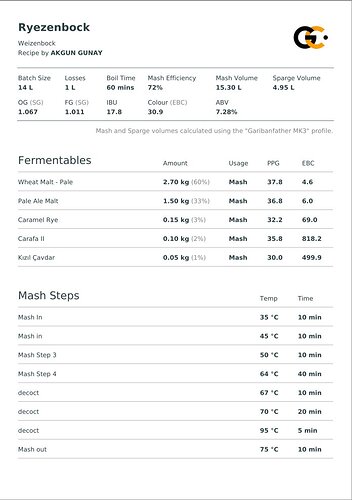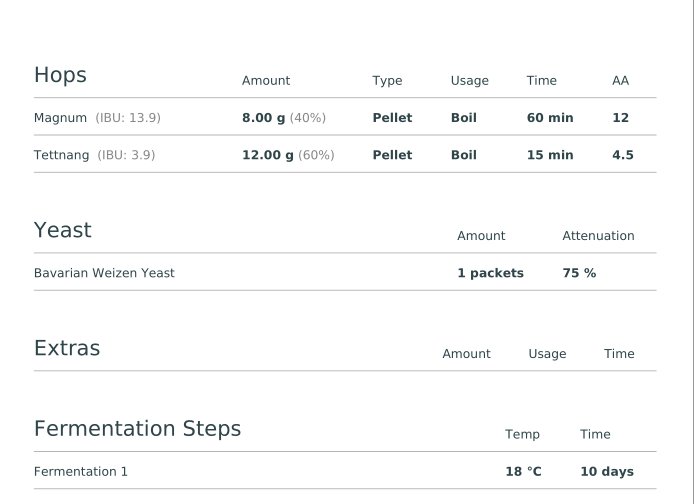Bu olmasa eksik kalırdık…
Yine sevgili @magunay’ın affına sığınarak paylaşıyorum.
Şimdilik burada dursun, üzerinde konuşacağız. Kaynağım Stan Hieronymus, Brewing with Wheat
SCHNEIDER AVENTINUS
Original Gravity: 1.076 (18.5 °P)
Alcohol by Volume: 8.2%
Apparent Degree of Attenuation: 82%
IBU: 16
Malts: Pilsener, wheat, chocolate
Hops: Magnum, Hallertau Tradition
Yeast: House yeast
Primary Fermentation: Yeast pitched at 61° F (16° C), rises to 71 to 73° F (22 to 23° C), 7 days
Also Noteworthy: Bottle conditioned with speise
Both Original and Aventinus contain 60 percent wheat, with Pilsener making up most of the barley malt. Original has 1 percent chocolate malt and Aventinus somewhat more. Local farmers provide an increasing percentage of the grain, both barley and wheat, while the hops come from the nearby Hallertau region.
About half are contracted with individual farmers and half with brokers. “To me the raw ingredients are very important. I like to go talk to the farmers. To me they are doing the hard work … giving us good materials,” Drexler said.
A step-and-decoction mash lasts about 3 hours, and it takes more than 3½ hours more to lauter into a special wide tank. Schneider mashes-in for 10 minutes at 35° C (95° F), then conducts a 10-minute rest at 45° C (113° F). Research has found this is a key temperature for creation of ferulic acid, which,
when it interacts with Schneider’s yeast, creates 4-vinyl guaiacol, giving Schneider’s beers a clovelike phenolic note that’s part of the brewery’s signature flavor.
Schneider shortens the protein rest at 50° C (122° F) to 10 minutes to avoid degrading the proteins and damaging head retention. (Were you to follow this schedule but adjust the ferulic acid rest, you would also want to change the protein rest appropriately.) After a 5-minute rest at 64° C (147° F) the brewers pull a one-third decoction. That is heated to 67° C (152° F) for 10 minutes, to 70° C (158° F) for 20 minutes, and then to 95° C (203° F) for 5 minutes. When the decoction is transferred back, the mash sets at 75° C (167° F).
Schneider acidifies its wort during the boil, because “if wort is too clean we get a neutral weissbier.” The brewers take a special strain of Lactobacillus and add it to wort drawn from the lauter tank. This mixture with a pH of 3.0 goes into the boiling kettle, improving the quality of the fermentation. Drexler finds his beer also tastes crisper. Magnum hops are added at the beginning of the one hour boil and Hallertau Tradition with 10 minutes left.
Drexler calls the yeast “a very old strain,” and says, “I don’t know what time it is from.” Schneider’s brewers pitch 6 million to 7 million cells per milliliter, but a) that’s particularly vital yeast straight from the propagator, and b) they are considering increasing the count for a faster start and greater microbiological safety. Fermentation begins at 61 to 63° F (16 or 17° C) and will reach 72° F (22° C) in the open vessels, lasting five days for Original and seven for Aventinus.


